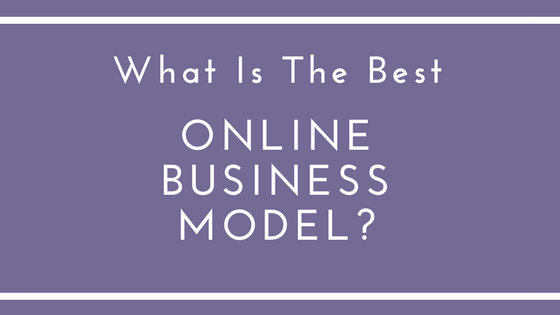

Having an online business sounds like a great idea. Yet for so many who go down this path, this business model doesn’t work.
Rather, it just doesn’t work for them.
So, what is the best online business model? In actual fact, there is no perfect or best online business model.
What works for one person could easily spiral into a disaster for another. The success or failure often depends on the time the entrepreneur has available, their budget, their past-experience, the product or service they are offering, the connections they’ve made and any one of a hundred other factors.
The best solution is planning and knowing your options. From there, you can start to work out which one is likely to be the best for YOU, given your unique circumstances.
Here’s a run-down on some of the best online business models, to give you a better understanding of what’s available.
Affiliate Marketing
This is a type of marketing where a business offers rewards to those recommending their products and/or services (affiliates). It may be that affiliates receive a payment for each paying visitor or customer that they send to the business, or some companies pay for each lead they’re sent. In the digital business world, this can be very easy. Simply copying and promoting a unique link for a product or service can bring a surprising number of visitors to a business’ website.
One of the best things about this business model is that you, as the affiliate, don’t need to create or manufacture the products, nor are you responsible for processing the product payments or distribution.
Drop Shipping
For businesses selling a physical product, drop-shipping is where the business selling the product doesn’t necessarily keep stocks of the product on hand.
In some cases, a business may sell a product they’ve never even seen. For example, Business A promotes a product that is manufactured by Business B. When a customer purchases a product from Business A, they send the shipping details to Business B who ships the product.
Another example would be where the business selling the product has the product made on an as-needed basis. Once the product is ordered, it’s created and then sent directly to the customer. There’s no need for it to go via the business selling it for them to ship to the customer.
One of the benefits to this model is that you don’t need to order minimum quantities of stock and arrange storage of it, nor look after the packaging and shipping. You may not even need to pay for the product until you’ve received the money from the customer. So it can be an extremely cost-effective business model.
On the downside, you can run into problems if a third-party product is out of stock and you don’t find out until AFTER you place the order for your customer. Your reputation also depends on the quality of the product and relying on the drop-shipper to send the product promptly and with proper packaging.
This can be a good business model for some … just do your research first and even buy the product for yourself, as a sample, before promoting it.
Selling on ebay
While ebay is not always seen as the best venue for a large scale company and is sometimes referred to as essentially “the world’s largest garage sale”, many small businesses do have a great business selling on ebay. This could include selling their products or selling unnecessary equipment.
I know several people who make very high, full-time incomes from their ebay businesses, with one couple making $50,000 per month. Of course, they didn’t start out making this income. They began by selling things they no longer needed from around their homes. Then they began buying wholesale products to sell.
While the ebay system does take some getting used to, it is intended to be very user friendly, hence its global popularity. Many small companies who can afford the time to give every customer attention will find it a great marketplace.
Done well, this can be a great home-based business for those who don’t mind packaging products and making sure they’re mailed daily.
Selling on Other Sites
However, ebay is only one site that allows nearly anyone to sell a number of different products under the auspices of a larger, more well known site. Etsy is a worldwide site that’s popular for selling things such as handicrafts. Meanwhile, a number of different businesses have signed on as Amazon affiliates, getting their products listed on Amazon in exchange for following certain protocols to maintain Amazon’s reputation.
If you are keen to sell your own products, you may be able to do so via one of these sites (e.g. Amazon.com). However you could also apply to become an Amazon Associate, whereby you can promote Amazon.com products and receive a commission for sales that come from your referrals. This comes under the “Affiliate Marketing” business model, above.
Selling Digital and/or Information Products
Selling purely digital products, from eBooks to smart phone apps, software to online training courses and the likes, is a means of making money that is growing in popularity. There are a number of storefronts focused on allowing users to sell such products, depending on what type of product you’re creating. (e.g. the Apple Apps store or Amazon’s eBook section).
While it can take some technical know how to get all these products together, they can be an amazing cost saver for companies who’s products are just as good in purely digital form as they are in physical form.
You can also create your own website and sell your products via your own site, rather than going through one of the bigger companies. If you want to sell digital products from your own website, the Kartra system will help make this easy for you. (Kartra will manage your website, emails, products, and so much more, all in the one place. In full disclosure, this link is an affiliate link so if you do end up subscribing to Kartra via my link, I may receive a commission from them as a thank you for referring you.)
Selling Physical Products

Online marketing has made it considerably easier to sell a great number of physical products as well. While there are a number of places to do so (such as the larger storefronts like ebay or Etsy), each of them has their own ups and downs, as well as terms of use. You should consider these carefully before signing on for them.
Make sure you check out what each of these sites does and doesn’t allow, the commissions or fees payable and what their expectations of you are.
As with selling digital or information products, you can also sell physical products via your own website. For anyone who’s not so tech-savvy, you can pay someone to set up your web site and a good shopping cart system. Although with a little effort it’s not overly difficult to manage.
You could also use the services of a fulfillment house. For a fee, they store your products and ship them out on your behalf. This is particularly worthwhile as your business grows and you have more and more orders to process each day.
Providing Services
There are also many services that can be provided online, such as:
- graphic design
- website design
- virtual assistance
- bookkeeping
- many forms of coaching and/or training
- writing
- social media management
- software development
- games development
- business management
- marketing
- … the list goes on.
With the amazing technology available today, many services can be provided without needing to visit your customers or meeting them face-to-face.
If you don’t have any particular skills to provide services yourself, that’s okay too. You can employ or contract others who are skilled to provide the services. This allows you to focus on marketing and managing your business. This is the business model I began with, in July 1998.
Membership Sites
Managing a successful membership site (or two) is another good online business model. You collate beneficial information on a particular topic and your members pay to access this content. Although this model can be more complex to set up initially, by charging a recurring fee you’re bringing in income over and over again. Meaning that you’re not having to continually market for new customers.
You will most likely still do some marketing to bring in new members, but by looking after your members they are more likely to stay on long-term. Also, the more you look after your members the more they will refer others to you.
Blogging
Many businesses find that maintaining a blog is a great way to stay in touch with their customers. But many people aren’t aware that a blog itself can be the main part of a business – and its income.
While there are countless blogs around, only a minority of those blogs are profitable from a business perspective. Some people just love to write and share their ideas and thoughts or promote a cause and that’s perfectly fine.
Others integrate monetisation strategies into their blogging so it earns an income. That income could be a few dollars extra here and there to full-time, 6- and 7-figure incomes.
Monetising strategies can include advertising from your site, selling products or services, charging a fee for premium content, “Pay Per Click” advertising (PPC) or recommending affiliate products.
If you’re recommending affiliate products, only do so if you feel they’re worthwhile. Don’t get caught up recommending solely because you’ll earn a commission. In the long-term, your readers will value your honesty and ethics and this will grow into more income over time.
Determining what the best online business model is, of course, is a complex question. Consider your budget for time and money and your existing experiences, along with personal preferences, lifestyle and ability. Learning a little more about each of these business models is also a good idea. This will help you decide which online business model is more likely best for you.
